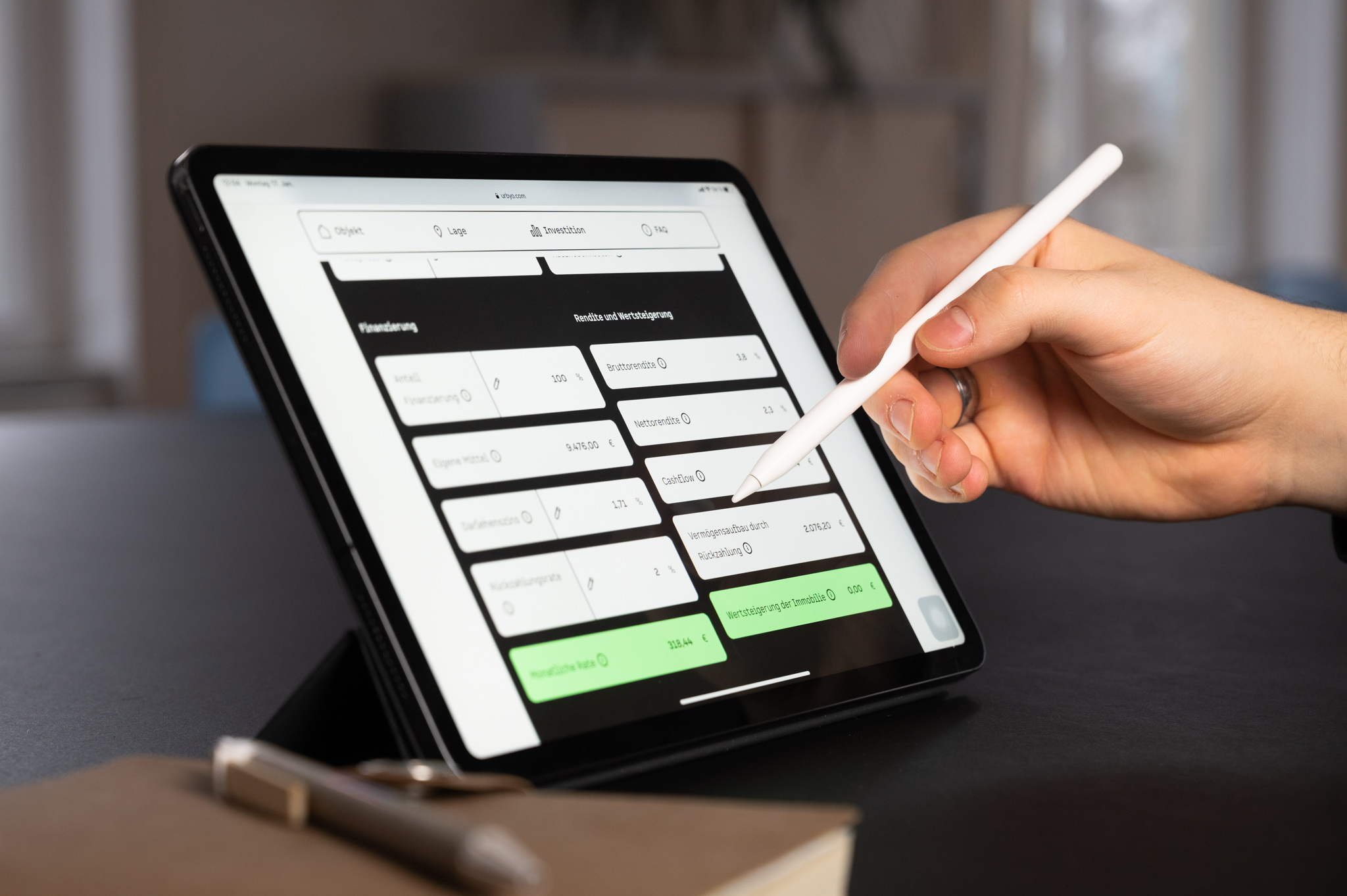Financing real estate with little to no equity: how much real estate can you afford?
One penny at a time

Property financing with little to no equity: it's possible
We all agree that investing in real estate is a good idea. But investing with no equity? Isn't it difficult to get financing to purchase an apartment or house if you don't have any money to put down yourself? Well, it depends. Plenty of banks out there will lend you 100% of the purchase price, but both you and the property you want to buy have to be approved by the bank. If your finances are in order and stable, then you've already won half the battle. If you can top this off with a property that checks out in terms of its condition, location, and expected returns, then — jackpot! — it's possible to buy a house or apartment without any equity.
Here's some other good news: it's also possible to generate equity. Here's where vendor take-back mortgages, subordinate mortgages, company loans, and securities enter the picture. You can obtain some of these from a bank, others from friends, family, your employer, or the seller, in the form of a loan or a guarantee.
If the money is lent to you and not given as a gift, you'll most likely have to pay interest on it. But you'll also be able to borrow less money from the bank as a result, which in turn means being offered a lower interest rate on the bank loan. It sounds kind of complicated, but it's relatively straightforward. Click here to see an example of a vendor take-back mortgage.
This clever move can quickly turn your no-equity situation into a real estate loan with significantly better conditions. The general rule is this: The more equity you can put toward the purchase, the lower your interest rate. As we mentioned above, it's entirely possible to finance real estate with little to no equity, but how well it works for you in practice depends somewhat on how willing you are to take risks. If you don't want to jump into the deep end all by yourself, you can reach out to us at any time. We also have a German podcast episode that you can listen to (German audio only): "Finanzieren ohne Eigenkapital" ("Financing with Little to No Equity."). You can learn about the most important points on this page as well.
What counts as "equity"?
When it comes to financing real estate purchases, equity is everything. While it is possible to get financing without equity, having it makes things much easier for you and the lender. Having equity equal to 20-25% of the purchase price is an excellent, solid guarantee for the bank. It means you can cover the closing costs and also pay a portion of the purchase price yourself. The bank will "reward" you with lower interest rates for putting more equity towards the purchase, which will save you a good amount of money over the loan's lifetime.
When it comes to real estate financing, banks consider the following items to be equity:
Cash
Money in savings accounts, instant access savings accounts, and fixed-term deposit accounts
Home loan and savings contracts that are available for draw-downs
Endowment policy and pension scheme payments
Assets in the form of securities, precious metals, or other real estate
Personal loans from friends, family, your employer
If you are interested in learning how to save equity or invest in different ways, head over to the Urbyo Community to get advice from our experienced users.
Financing real estate with money from the seller
All roads lead to Rome, as the saying goes. And many roads lead to real estate ownership too. Urbyo is your guide. We know every twist, turn and back way, and we're here to show you every option at your disposal. So, let's hit the road:
First, we have the vendor take-back mortgage, which is pretty straightforward: you borrow a certain amount of the purchase price from the seller (vendor) — usually between 5% and 10% — and you pay it back within a specified time. Because this is a personal loan, you will probably have to pay a higher interest rate than you would on a bank loan. But don't let that scare you. A vendor take-back loan increases your equity, which means you can make a larger down payment on your bank loan, resulting in a lower interest rate.
On paper, a slight decrease in the interest rate on your annuity mortgage might seem insignificant at first. But paying even a fraction of a percent less on a large sum over the entire length of your lock-in period can save you a lot of money.
| 100% bank loan | 10% vendor take-back mortgage + 90% bank loan | |
|---|---|---|
| Purchase price | €200,000 | €200,000 |
| Vendor take-back mortgage | - | €20,000 |
| Bank loan | €200,000 | €180,000 |
| Bank interest rate | 1.60% | 1.30% |
| Interest paid to the bank in year 1 | €3,200 | €2,340 |
| Seller interest rate | - | 3.00% |
| Interest paid to the seller in year 1 | - | €600 |
| Total interest paid in year 1 | €3,200 | €2,940 |
In this example, the vendor take-back mortgage ends up saving you €260 in interest in the first year. And by the time you're finished paying back the vendor take-back mortgage, you'll have saved €860 — all that money from having "just" a 0.3% lower interest rate on your bank loan. As you can see, over the entire lifetime of your lock-in period, it adds up. A loan arrangement like this one can be an excellent option for people with a lot of income but little equity.
A vendor take-back loan can be a good idea for the seller as well. The sale of their property will put a good amount of cash in their bank account, and assuming they aren't planning to use that money for something else, a personal loan like this can generate good returns. And since the seller is already familiar with the property — for example, they know whether or not rent gets paid on time — there is less risk from their point of view.
Asking another bank for money
The next option, known as a subordinate mortgage, might be something you've never heard of before — no big deal. In cases where you have enough equity to make a decent down payment on your mortgage, banks tend to offer you reasonable interest rates. Once you find an offer that works for you, there really is no need to keep hitting up other lenders for alternatives.
But if you're trying to get financing with little to no equity to buy a house or apartment as an investment, a subordinate mortgage can be a clever way to increase your equity, similar to a vendor take-back mortgage. And it isn't all that uncommon.
With a subordinate mortgage, you usually borrow an amount equal to your closing costs plus 10% of the purchase price, frequently through a different bank. You have the money disbursed to you, take it to your primary lender, and they offer you a mortgage at a better interest rate. Not too shabby, huh?
Example
You want to buy an apartment for €100,000. You don't have any equity, so you have to finance 110% of the purchase price. That is, you have to borrow €110,000 to cover the purchase price and the closing costs.
SCENARIO A: Bank 1 offers you a loan for the total amount at an interest rate of 2%. You end up paying €2,200 in interest in the first year.
SCENARIO B: You borrow €90,000 from Bank 1 at an interest rate of 1.5%. That gives you an interest payment of €1,350 in the first year. You borrow the remaining €20,000 from Bank 2. Due to its lower priority in the land register, Bank 2 lends you the money at an interest rate of 2.5%, which increases your interest payment in the first year by €500. In total, you pay €1,850 in interest in the first year, which is €350 less than Scenario A.
A subordinate mortgage is like a standard mortgage, except that the bank that lends you the money is given lower priority in the land register. It's a risky move for a bank: If you become insolvent, the lower-priority bank will not receive its money until the primary lender has received theirs in full. To buffer themselves against this risk, the bank lends you the money at a somewhat higher interest rate. If you are financing more than 90% of the purchase price with a bank loan, then the interest rate on the subordinate mortgage will be somewhere between 0.3% and 0.8% higher. The higher rate can be worth it, though, since it will enable you to get a lower interest rate on the bigger loan.
Tip
Instead of using your subordinate loan just to finance your closing costs (about 10% of the purchase price), borrowing an additional 10% of the purchase price on top of this can end up saving you a lot of money by lowering your interest rate on your primary loan.
Have questions? We're here to help.
Subordinate mortgages for personal-use real estate: the same but different
Subordinate mortgages are a common way to cover the costs of renovations or to finance an extension on a house or apartment that you intend to live in yourself. These costs are often not factored into the amount you need to borrow to purchase the property itself, and they can quickly turn out to be more expensive than you initially thought. If you don't have equity or savings to put towards the purchase, money will get tight.
The interest rate on the subordinate mortgage will be higher than on the primary loan in this case too, but this time the point isn't to generate equity; it's to give you some breathing room if the primary loan isn't enough. For this, you don't need to find a second bank willing to jump on board. In most cases, your principal bank will be ready to accept a lower-priority position in the land register to give you a second loan if they think the work you want to do on the property will increase its value.
Generating equity with a company loan
One of the many ways to finance real estate if you have little to no equity is to generate equity through your employer. Companies can offer loans as a fringe benefit to increase their attractiveness as a place to work. These are called company loans.
As an employee, these loans can serve as an alternative to a salary bump and can also be a way for you to chip away at the down payment on your real estate financing. The interest rate is often lower than the market rate, but the amortization rate is higher. But here again, you are increasing your equity stockpile, which means that you will get better conditions on your bank loan.
Company loans aren't entirely risk-free, though. If you quit or lose your job, you may be required to pay back the loan under different conditions because you aren't an employee any longer. To avoid getting into a legal battle with your employer, you should arrange to have the interest rate set to the market rate if and when your employment relationship ends. Anything else would be illegal.
Company loans are pretty well established among larger companies today, but if you work for a small to mid-sized company, there might not be a precedent for it. But it never hurts to ask.
Want some good arguments in favor of a company loan that you can take to your employer? Head over to the Urbyo Community to talk to other experienced investors.
-> Visit the Community to tap into the collective experience of our users
Securities over cash: other ways to finance real estate with little to no equity
The thought of accruing so much debt might make you feel a bit queasy at first, but if you want to buy a house or apartment with little to no equity, there's no getting around it. But this doesn't mean you always have to take out additional loans or pay more interest. Additional securities (Zusatzsicherheiten) are another form of guarantee for banks that allow them, for example, to reduce collateral risk when you want to borrow 110% of the purchase price.
The classic form of additional security is a surety from friends, family, or your employer. The alternatives are an endowment insurance policy or a home loan and savings contract. If you already have one of these, all you have to do is continue paying into it. When it's time for the security to pay out, the money goes directly to the bank — kind of a bummer, but hey, you'll be paying less interest over the next 10-20 years.
Financing real estate with no equity: is it a good idea?
Under certain circumstances, it is entirely possible to finance the purchase of real estate with no equity. You can quickly turn your no-equity situation into a real estate loan with significantly better conditions with a few clever moves.
Especially if you need to borrow 110% of the purchase price, looking into all of your options is a must. Some banks will let you borrow money for both the purchase price and the closing costs, but this depends heavily on the region, your financial situation, and the property itself. From the bank's point of view, this arrangement carries a much greater risk of something going wrong or of the financing falling through because of the smallest increase in expenses. To counter the increased risk, the bank will make you pay a higher interest rate.
The general rule is this: The more equity you can put toward the purchase, the lower your interest rate. As we mentioned above, there are definitely ways to finance real estate with little to no equity, but how well it works for you in practice depends somewhat on how willing you are to take risks.
When you need to borrow 110% of the asking price
So, you've found a property you want to buy, but you don't have enough equity yet to get the conditions you want on your mortgage. If interest rates are low, it can be a good idea to ask for zero-down financing anyway. That's because interest rates might go up again by the time you save extra equity for a down payment. And that could easily eat up what you've managed to save. Not cool.
With 110% financing, you borrow money to cover the purchase price of the property and the closing costs. Your primary mortgage doesn't cover the closing costs, which is why you need to take out a personal loan as well.
Also: because you're borrowing and paying interest on a higher amount, going with 100% or 110% financing means you will have to pay significantly more each month than you would if you were to make a down payment. You'll need to be able to afford these payments.
| Real estate financing with equity | 100% financing | 110% financing | |
|---|---|---|---|
| Purchase price | €100,000 | €100,000 | €100,000 |
| Closing costs | €10,000 | €10,000 | €10,000 |
| Equity | €30,000 | €10,000 | – |
| Amount you need to borrow | €80,000 | €100,000 | €110,000 |
| Effective APR | 4% | 5% | 5% |
| Loan amortization rate | 2% | 2% | 2% |
| Personal loan for closing costs | – | – | €10,000 |
| Personal loan APR | – | – | 6% |
| Personal loan amortization rate | – | – | 2% |
| Personal loan monthly payment | – | – | €66.67 |
| Total monthly payment | €400.00 | €583.33 | €650.00 |
Something you should keep in the back of your mind with zero-down financing: there is a risk that the bank will demand a specific percentage of the loan sum as additional security if the valuation of the property changes and it loses value on paper as a result. The amount the bank will want from you can quickly come to 20-30% of the loan sum, and in most cases, you'll have to pay it in a relatively short amount of time: somewhere around two to four weeks. If you don't have any money saved away that you can use to cover this, the bank could potentially foreclose on the property.
Our take: zero-down financing isn't possible — and doesn't make sense — unless the financials are solid. So be sure to make realistic calculations and only consider buying a property if it fits your budget and economic situation. If you want to save money, you should look into other options, like vendor take-back mortgages, subordinate mortgages, and company loans. All of these are clever ways to quickly and easily generate equity — on paper at least — and to unlock better loan conditions with your primary lender.
If the costs are simply too high right now, then wait a while and try saving up equity in other ways. There will always be another investment opportunity.


